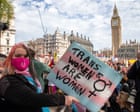
In recent developments across Europe, a significant collective of transgender advocacy groups has banded together to call upon the Council of Europe to address concerns related to the implementation of a UK supreme court ruling on gender identity. Meanwhile, in Hungary, a vibrant and expectant air prevails as Budapest prepares for a historic Pride march aimed at opposing governmental rollbacks on rights. These parallel initiatives highlight a shared commitment to safeguarding and celebrating diversity in being and love.
The coalition of transgender rights advocates has drawn attention to the necessity for international human rights oversight concerning the UK’s handling of gender-related legal protections. Discussions center around the overarching predicament posed by restrictions on transgender individuals accessing facilities or joining groups that align with their identified gender, thus situating them in what campaigners describe as an “intermediate zone” of gender. The organisations have articulated concerns that this conundrum impinges upon the rights enshrined in the European convention on human rights (ECHR). The advocacy groups’ letter to the Council of Europe underscores a desire for a thorough investigation and a fair implementation of the ruling, with an emphasis on ensuring that all individuals in the UK can enjoy their fundamental rights without boundaries.
Parallel to these advocacy efforts, the city of Budapest stands as a beacon of hope and resilience, readying itself for what is anticipated to be a remarkable Pride march. Budapest Pride has grown beyond a mere celebration, becoming a powerful rally against oppressive state actions that threaten personal freedoms. Organizers are anticipating record numbers of participants, drawn not only from Hungary but from across Europe as a unified front against policies perceived as regressive.
This surge of support is marked by the presence of campaigners and political figures like Hadja Lahbib, the European commissioner for equality, who offered words of encouragement and resilience. She emphasized that this gathering transcends the occasion of a single Pride march; it represents the collective right of individuals to embrace their identity and live authentically, irrespective of geographical boundaries. The sentiment shared by many is one of solidarity and resistance against any infringement on individual rights, ensuring that declarations of identity and feelings of love remain untouched by political biases or legal hindrances.
Both the call for European oversight regarding transgender rights in the UK and the Budapest Pride march underscore a common narrative centered on unity and the perseverance of human dignity. Each of these scenarios calls for empathy, understanding, and multilateral support in preserving the rights of all individuals to exist freely and express love in its myriad forms.
As these events unfold, there is a mindful recognition of the broader social changes being navigated not only within Europe but globally. The push for inclusive measures and observances serves as a reminder of the latent power harnessed by communities united in purpose. These efforts encapsulate a growing acknowledgment of diversity as a strength, fostering a more inclusive society that appreciates and upholds each individual’s right to self-expression and love.
The calm determination exhibited through both the call for human rights monitoring and the vibrant expressions of Pride reflects an innate desire for a world where every person’s uniqueness is celebrated. As these movements gain momentum, they symbolize a steady advance toward fuller recognition and implementation of human rights for all, offering hope and inspiration for current and future generations to continue championing for equity and compassion across all walks of life.
Source: {link}
